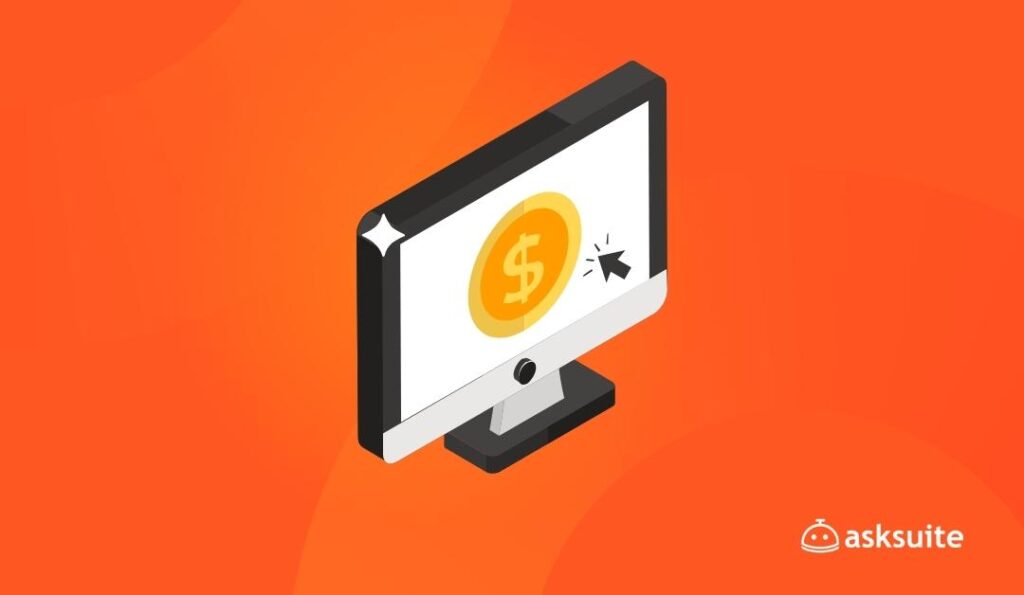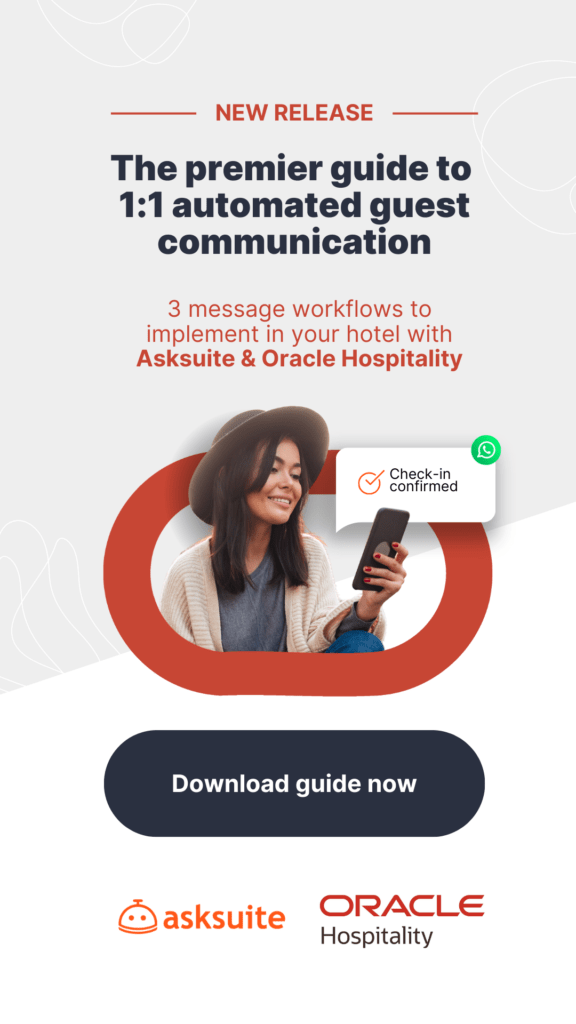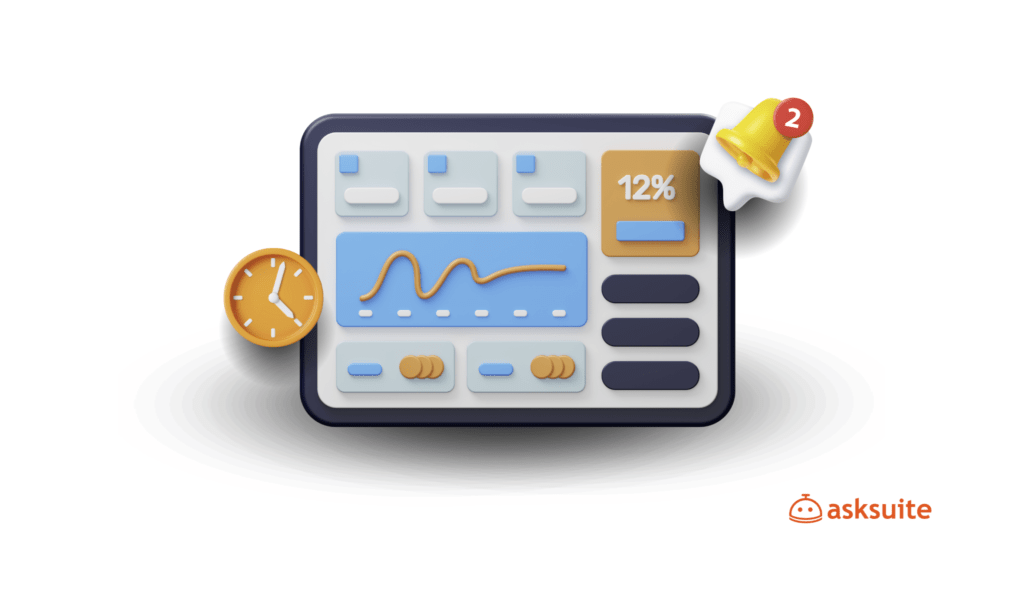If you run a hotel website, how are you attracting visitors?
Location-based SEO, high-quality images and videos, and aesthetically pleasing social media pages can work wonders for visibility, but so can PPC.
Here, we’ll explain everything you need to know about hotel PPC campaigns, from how they work to the different types you can choose from and exactly how they can benefit your website.
Let’s get started.
Tired of looking for the best ways to convert more bookings on your hotel website? Asksuite & Umi have joined forces to help your website stand out and make direct reservations go sky-high with a curated selection of guides and materials, which you can download for free: [Download Now]
What Is PPC?
Pay-per-click (PPC) is a form of online marketing in which advertisers pay a fee every time their ad is clicked on.
With this method, you can essentially “buy” visitors to your site through strategically placed ads, to reach more potential customers than organic traffic may be able to bring you.
The amount of money you spend on this type of advertising depends directly on how many users click on your ad when they see it.
Depending on the type of PPC campaign you choose, a user might see your ad while scrolling through social media, browsing Amazon, using the Google search bar and more.
A PPC marketing agency can help you set up this type of campaign, give you advice on which ad style to choose, and help you get the most bang for your buck in order to see results.
How is your marketing strategy going? Experts Rupesh Patel and Allan Nelson shared valuable insights on this webinar about Hotel Marketing Strategies to Increase Direct Bookings. You can access it for free. Explore!
Types of PPC Campaigns
There are eight main types of PPC campaigns you can utilize to bring more traffic to your booking site. The types include:
Search ads: Search ads are the most common type of PPC. In this type, the advertiser chooses keywords they want their ad to show on. When a user types these keywords into a search bar, the ad shows up at the top and bottom of the search page.
Display ads: Display ads are similar to search ads, but instead of showing up based on keywords, display ads appear when a user shows an indication that they may be interested in your products or service. If your business is located in Los Angeles, for example, your ad will display when a user searches for “places to stay in Los Angeles.”
Remarketing ads: Remarketing ads target users who have previously visited your booking site. These ads remind potential customers of your offering and aim to pull them back into the sales funnel.
Shopping ads: Shopping ads are similar to search ads in that they show up based on search terms. The difference is that with shopping ads, an image is also displayed.
Video ads: The majority of businesses use video in their advertising efforts. Video ads for your business can show up on YouTube and other platforms.
Paid social ads: With paid social ads, you can advertise on the social media platform of your choice, from Instagram or Facebook to Twitter, LinkedIn, Snapchat, and more.
Gmail sponsored ads: With this PPC campaign, you can advertise your hotel on personal Gmail accounts.
Amazon ads: Amazon offers PPC ads in the form of sponsored product ads, headline search ads, and product display ads. With the millions of people visiting Amazon each day, your website could benefit from using the giant as an ad platform.
What’s The Difference Between PPC And SEO?
PPC is a great way to expand your audience reach, increase your visibility and, ultimately, grow your revenue. As we mentioned earlier, so is SEO.
Listen to episode #20 of Hotel Cast to learn How to Revamp Your Revenue Strategy? With Kate Burda, the founder, and CEO of Kate Burda & Co.
So, what’s the difference between using PPC for visibility versus using good old-fashioned SEO?
Let’s look at the main ways PPC campaigns differ from search engine optimization (SEO):
- PPC is a type of online marketing where you pay a fee whenever your user clicks on your ad. In some cases, that ad appears on top of Search Engine Results Pages (SERPs).
- On the other hand, SEO is a marketing process that helps you achieve a high ranking on SERPs through organic traffic.
- SEO results are always below paid ads, while PPC ads are located on the top and bottom of the page.
- Unlike PPC ads, SEO is free.
- SEO results occupy most of the space in SERPs, while PPC is limited to only a few ads per page.
How To Choose A Keyword For Your Hotel PPC Campaign
Let’s say you’re opting for a search ad, display ad, or shopping ad. In this case, you need to choose a keyword. When a user types in this keyword, that’s when your ad will appear.

Effective keywords in your hotel PPC campaign are a vital part of the conversion. You want to cast a semi-wide net to reach new audiences, but you also want to make sure your ads are targeting the right people who are most likely to be interested, and click.
Before selecting your PPC campaign keyword, first, research your target audience and their online search habits. Not only should your keywords be specific to reach your potential guests, but they should also be relevant to your brand and your offering.
Keywords can be either short-form or long-form. In your case, it’s best to opt for a long-form keyword. This will help you target and attract a more relevant audience.
Examples of long-form keywords for your hotel PPC campaign include:
- San Francisco budget hotels
- All-inclusive resorts Cancun
- Places to stay downtown Atlanta
- B&B Charleston, South Carolina
- Resort and spa Denver
5 Key Benefits Of Hotel PPC Campaigns
From better brand visibility and increased audience reach to direct bookings, here are five key benefits of hotel PPC campaigns:
1. They Enable Your Hotel To Rank First On SERPs
From hotels and inns to resorts and more, the competition for booking sites is stiff. How can a small bed and breakfast go head-to-head with a fancy high-rise hotel? The answer is PPC.
PPC ads essentially even the playing field and allow you to go toe-to-toe with your competition by placing your site next to all the rest, regardless of size, brand name, and other factors.
2. They Help You Secure Last-Minute Bookings
Did you know that 72% of U.S. travelers book their hotel two days before their check-in date?
When you pay for your ads to appear first on SERPs, your hotel has an opportunity to be seen first for last-minute guests and spontaneous travelers.
Last-minute guests know that they are racing the clock, and they need to book immediately. For these search keywords, add copy that highlights FOMO (fear of missing out) to build a sense of urgency and/or consider highlighting promo deals for late bookings.
3. They Provide Quick Results
Thanks to a pay-per-click campaign, an increase in your hotel’s website visitors can be seen as early as a few days into the campaign. How?
Since your ads are on top of the search results, your users are more likely to click on your ads, especially if they are looking for quick bookings at the last minute. PPC ads increase your visibility and widen your reach almost instantaneously.
They help ensure your business is shown to the right audience, at the right time.
4. They Allow Guests To Book Directly
Direct bookings often include perks such as providing a more bang-for-the-buck room rate, along with a better customer experience and improved customer engagement since there isn’t a third-party involved, like a travel agent.
When you rank on top of Google’s first page, this allows your guests to book directly from your hotel, enabling you to earn more money and your guests to save more.
5. They Allow You To Promote Special Offers
While SEO remains somewhat general on your site to attract a wide audience, you can target more specific audiences with PPC campaigns.
For example, say your hotel is in downtown New Orleans. In the months or weeks leading up to Mardi Gras, you could run special PPC ads to target users who are looking for the perfect spot to stay as they celebrate the annual event.
Wrapping Up On Hotel PPC Campaigns
Investing in a PPC campaign is a great way to increase visibility, cast a wider net for potential visitors and go toe-to-toe with booking sites of all sizes. While SEO is also valuable in increasing visibility and bringing in organic traffic, PPC can give you a boost when it comes to traffic that’s not organic.
While PPC campaigns can bring a variety of benefits, some based on the specific type you choose, five key benefits include:
- They enable your hotel to rank in SERPs
- They help you secure last-minute bookings
- They provide quick results
- They allow guests to book directly
- They allow you to promote special offers
If you’ve never used pay-per-click advertising before, consider reaching out to an agency to help you get started.
With the right ad type, the right keywords, and the right platform, your PPC campaign will be a success. You’ll see an increase in traffic, which in turn will lead to an increase in conversion for your hotel.
About the Author: Travis Dillard is a business consultant and an organizational psychologist based in Arlington, Texas. Passionate about marketing, social networks, and business in general. In his spare time, he writes a lot about new business strategies and digital marketing for DigitalStrategyOne.






